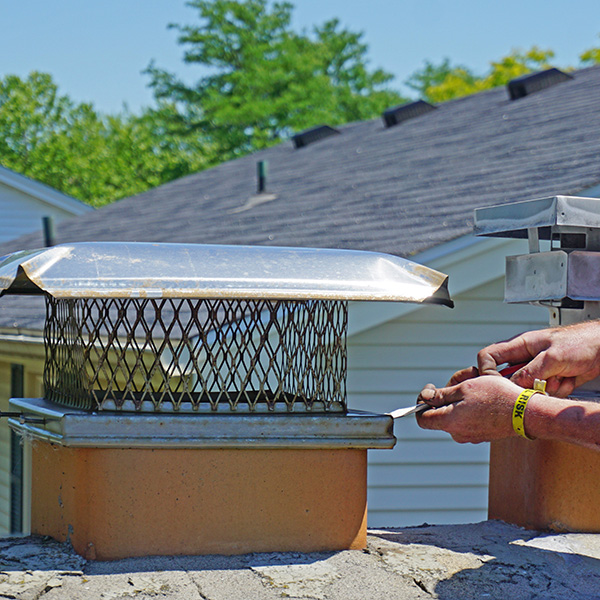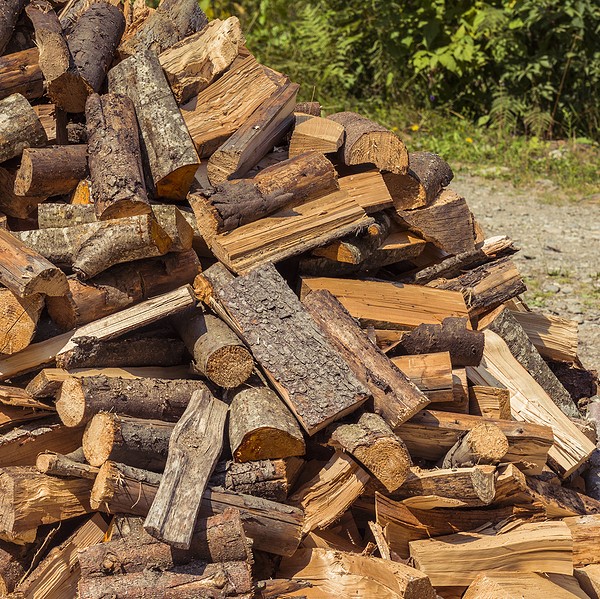With cold weather expected to arrive in the Kansas City KS/MO and Southern Plains region earlier than usual, many residents are scheduling their annual chimney inspection and cleaning to make sure their fireplace will be safe to operate. However, depending on how often you light the fireplace, it may need additional cleanings. Here are five things you can do to keep your fireplace clean and safe between professional cleanings.
 Make Sure Your Chimney Flue Cap is Secure
Make Sure Your Chimney Flue Cap is Secure
The chimney cap is an essential device that helps keep rain and snow from dripping into the fireplace. It also helps to prevent downdrafts that can send smoke and carbon monoxide into your home. The chimney cap should also have a mesh screen to prevent leaves, debris, and small animals from entering and obstructing the flue. However, normal wear and tear and exposure to extreme weather conditions can result in chimney cap damage. In some cases, strong gusty winds can dislodge the chimney cap or blow it off the structure, exposing your chimney and fireplace to external elements. Therefore, it’s a good idea to check to make sure your chimney cap is secure to help keep your fireplace clean and safe between cleanings.
Trim Nearby Trees
Trees with branches overhanging near or against the chimney are a fire and safety hazard. Any leaves or debris that block the flue can increase exposure to smoke and harmful fumes. Also, the heat from the vent or a hot ember that flies out can ignite overhanging limbs and cause a house fire. Tree limbs and leaves should be at least 15 feet away from the top of the chimney, according to the Chimney Safety Institute of America (CSIA).
Remove Excess Ashes
Before lighting the first fire of the season, a one-inch layer of ash in the bottom of the fireplace will help start the fire. However, too much ash in the fireplace can have the opposite effect and diminish your fires. When you notice the ash pile is getting high enough to reach the grate, it’s time to remove the excess ashes. First, allow the fireplace to cool for at least 12 hours. Then, remove the grate and set it aside. When the coals are no longer warm, it is safe to scoop the ashes into a metal container. Finally, sweep or vacuum any remaining debris in the fireplace.
Clean the Firebox and Grate
The combustion gases created when burning wood are corrosive, and you may need to clean the firebox between professional cleanings weekly if you use the fireplace daily. Wear a face mask and eye goggles when cleaning the fireplace so you don’t breathe in the soot and ashes. After removing the ashes and sweeping or vacuuming debris in the fireplace, you can use an all-purpose household cleaner and a medium-bristle brush to remove the soot, stains, and residues that are sticking to the interior masonry walls of the firebox. Then wash the walls with water to rinse any remaining cleaner residue. You can also clean the andirons and grate with the same household cleaner but do it outside to avoid staining your flooring. Before replacing the grate in the fireplace, spread a one-inch layer of ash on the floor of the firebox to make your fires more productive.
 Burn Seasoned Wood
Burn Seasoned Wood
Burning only seasoned wood will also help keep your fireplace clean and safe in between professional chimney cleanings. Fresh or “green” lumber has a very high moisture content, usually 60% or more, which creates a lot of smoke and creosote. On the other hand, wood that has been seasoned or dried for at least six months has a much lower moisture content, about 20% or less, resulting in a fire that burns cleaner with less smoke and creosote.



